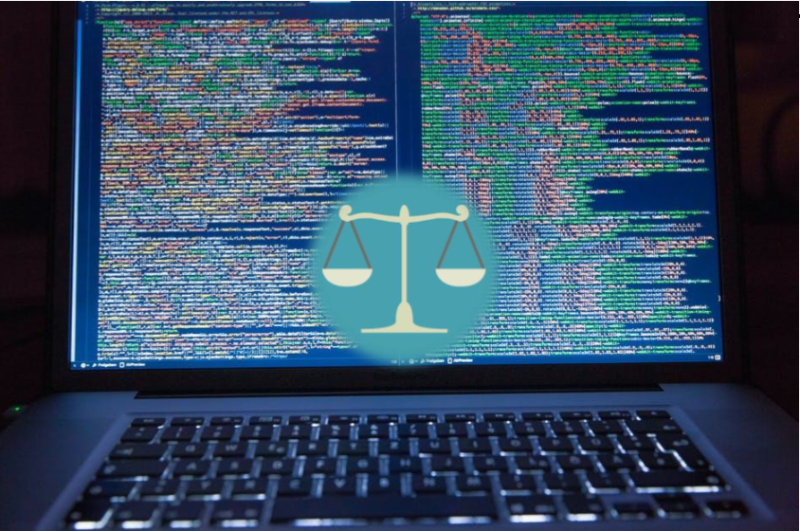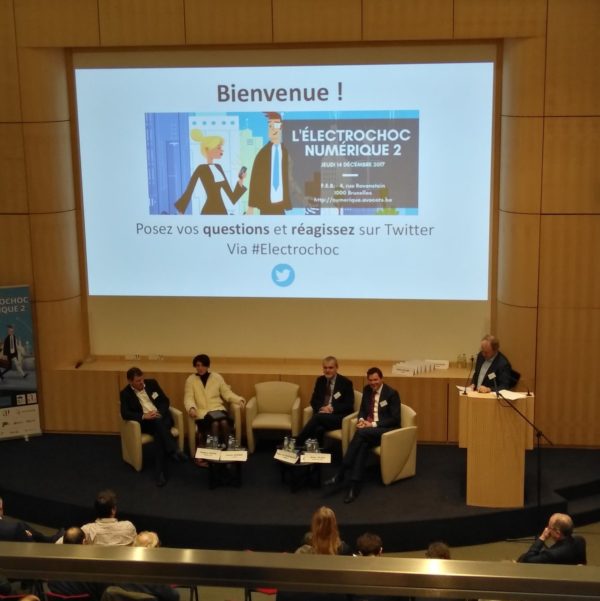Please find below a very interesting article by Patrick Conrads, member of the AEA-EAL Board of Directors and Belgian lawyer, on how digital revolution affects lawyers.
Like many other professions, lawyers are affected by the digital revolution. Technological tools and artificial intelligence lead to simplified and automated procedures that upset/subvert/shake our traditional ways of working. In addition, lawyers no longer have a monopoly of knowledge, which is now open, free and available to all. By opening up knowledge, the digital revolution with its portability tools is pushing for transparency, responsiveness and collaborative mode.
The profession is now faced with multiple challenges: economic sluggishness, globalized competition, artificial intelligence, the emergence of an increasingly sophisticated outsourcing, transformation of some of its know-how into commodities. It is also competing with other professions, that is why it is now essential to focus our efforts on driving change.
Although the brand „lawyers” carries many guarantees of quality of service (strong ethics, demanding discipline, guaranteed competence), these essential elements are not sufficient to allow the profession to build its attractiveness and profitability model without holding account of the expectations expressed by consumers.
Lawyers must therefore question the value of changing the way they work, interacting with their clients and with their various partners (jurisdictions, administrations, other professionals). Innovation requires to increase the risk culture and also requires phases of implementation and adaptation that are not always compatible with the profitability requirements of firms.
Despite this, digital electroshock must be seen as a real opportunity for lawyers, the challenge being to think about how to take advantage of it.
Indeed, advances in new technologies offer many advantages: saving time, money, quality and efficiency in the collection and pre-processing of legal information, for example.

1.
New tools of work develop as well as predictive justice. With softwares, it is possible to calculate the probabilities of success in court and to predict the amount of compensation that clients are likely to receive. These softwares recover a maximum of rendered decisions and allow a quantification of the legal risk. Predictive justice is a step forward for litigants because they can have an idea of the chances of success of their action, but the software remains only tools.
However, the use of simple technologies makes it possible to increase accessibility without weighing on the lawyer’s agenda, for example by setting up extranets (Internet tools allowing the storage and the sharing of documents: contracts, procedure, company documents, or calendar sharing). Technology can therefore be a source, under certain conditions, of increased proximity and better service (doctrine.be, droitbelge.be).
In addition, new tools that are now financially accessible make it easier to generate simplified legal documents and platforms for linking lawyers and litigants (my-lawer.be). Platforms also appear for mediation or amicable dispute resolution with reasonable stakes in a diversion perspective.
Other tools exist only at a rudimentary stage but should multiply rapidly, like chatbots. It is a program that incorporates an algorithm to establish short conversations between a user and the website. Also known as „conversational agents”, these programs will develop an increasingly sophisticated language and draw on an increasingly rich mass of information (associated with the recurrence of certain frequently asked questions) to allow a first sorting in the questions asked by the litigants: the user asks a question „in natural language” and gets an answer as soon as the machine has identified the question.
Computer programs of artificial intelligence are also developing. The best known in the legal world is Watson, a program developed by the IBM company, which responds to the questions asked in natural language. A specific version of Watson has been developed specifically to answer legal questions: Ross40, which has been „hired” by a dozen law firms. This program is not only able to find among millions of documents a legal answer to a question asked, but also has a system of learning: It self-improves as it works.
These Artificial Intelligence tools will eventually replace the lawyer in his job as a legal technician to extract relevant references to the case. The lawyer will focus on the strategy and the human aspect of the case, which is at the heart of his job.

2.
On the other hand, the digital revolution has also changed the requirements of customers who are better informed, Google being their first consultant. They want simple answers in fast deadlines. Clients’ legal needs are evolving into turnkey solutions, which forces us to reinvent our services and the relationship with our clients. Two major implications are to be taken into account:
The first one concerns the standardization of some of our services: Regular products such as general sales conditions, company statutes, a rather simple work contract are now „standardizable”. Faced with the already active presence of online platforms with more standardized services, we can see that the client now accepts the idea of reducing some of his expectations (especially the „tailor-made” dimension) to satisfy an immediate need or constraint budget. The lawyer will have to accept this phenomenon of standardization of some of its services, because of the appearance of the digital.
The second implication relates to the phenomenon of rating benefits: It is not unlikely that in the long run, there will be indications on lawyers in relation to defined criteria as its efficiency or the respect of the budget. This notation can be unfounded, unfair or simply artificial, but it is a phenomenon inherent to the Digital. If we do not accept this phenomenon of „desecration” of certain aspects of our profession, then we will undergo this digital change rather than accompany it.
Customers have become digital consumers and are looking for more agile solutions for communication, pricing, listening and content. They are more and more demanding which has consequences on the valuation of the service, on the prices practiced and on the way the right is approached as product. The client wants to become an actor of his file and the lawyer becomes neither guide nor companion of road.
The challenge is to learn how to serve them the way they want. The need for legal advice is immense in our complex society, and machines can offer us more resources and time to put the human in the center. Too many lawyers today perceive innovation as a threat rather than an opportunity. However, it is by developing a prospective vision of its activity and refocusing on its added value that the lawyer of tomorrow will be the winner of the digital revolution. The client will no longer come to his lawyer to obtain an obscure or abstract legal answer. He will come to share a common experience with his lawyer and together they will work out the best practical solution to adopt.

3.
Therefore, the lawyer will have to change his practice. He will have to have the tools of Artificial Intelligence while remaining focused on his primary role, that of consulting. Also, measuring risks, listening, empathy, pedagogy, ethics, deontology and creativity will remain constant. Explaining the issues to the client, diagnose, and find solutions cannot be done only through a machine, the lawyer will always use his skills to know whether it is advisable to follow or not the opinion of the machine given as an indication.
Artificial Intelligence should not be seen as competing with human intelligence, but as complementary. It will always take humans to think the rules, to elaborate them, to do justice and to apply the law. Even though people have access to information, they do not have the skills to understand it. The lawyer will always be indispensable to interpret the rules of law. He also has an increasingly important role to play regarding the psychological, social and human support of his clients. An innovative lawyer does not see justice as an end but as a way to do his job better. He uses technology to rethink and improve the key elements of his business and his added value.
In France, the process of change is already well underway. Lawyers expand their field of action: they collaborate with other regulated professions, manage transversal projects, and develop innovative tools.
Emmanuel Macron initiated the movement by passing a bill in 2015 that opens the door to interprofessionality, external financing and authorization to market related goods and services on an ancillary basis. „These adaptations are at the origin of a remarkable dynamic of creation of new structures and new technological solutions „. (Stanislas van Wassenhove, Lawyer And Initiator Of The Digital Electro-Choc Conference)
In Belgium, the Bars (Avocats.be and the OVB) have created in 2016 a digital platform to put lawyers in touch with the courts and tribunals. A year later, young lawyers launched the Incubateur.legal to educate lawyers about new technologies and innovation;
In addition, the European Incubator of the Brussels Bar (INCUEBRUX), which aims to complement the incubator of the O.B.F.G, has just been created. This incubator, which wanted to be mixed and international, has for mission to ensure the training and the information of the lawyers of the bar of Brussels on the technological developments which concern them, to be a place of exchanges and debates on the modernization and the reform of the legal profession, to act to ensure that the bar is committed to the digital revolution in accordance with its values and to federate European initiatives on technological innovation and its implications for the profession. Several projects are already in preparation (http://www.incubateur.brussels).

4.
In conclusion, the developments in artificial intelligence offer the lawyer new perspectives to manage knowledge, organize data, and anticipate the outcome of litigation through predictive tools and thus free up time to accentuate its advisory role.
Beyond certain prerequisites (finance, IT, communication, project management), the lawyer will open by developing his human and relational skills: listening, empathy, acceptance of failure, creativity, agility, adaptability, management of emotions, letting go and sharing experience. Emphasis will be on well-being rather than know-how.
For lawyers, being interested in innovation, not only technological but also economic, managerial and societal is a prerequisite for the necessary transformation to ensure the sustainability of the essence of the legal profession: to defend and advise the human.
Some people think that the technique is neutral and that everything depends on the way users control it. Others, highlight the dangers of any technical progress, including digital. Without wanting to be able to decide this debate, we can highlight the following certainties:
o Digital technology can make people aware of their legal needs and contribute to the knowledge of the law, which is an essential element of the rule of law.
o For professionals, the eruption of digital is a threat because the benefits become interchangeable, and are judged by customers only in terms of price, which becomes the main criterion of choice.
o Digital represents a world of opportunities: by breaking down the barrier of inaccessibility, it makes it possible to come into contact with non-consumers and thus gain a lot in productivity. Similarly, getting rid of tedious, non-value-added tasks also increases productivity.
As an indication, here are the digital proposals from the report by Kami Haeri, a lawyer at the Paris Bar, on „the future of the legal profession”:
o Develop a culture of innovation, integrating the concept of entrepreneurial risk into the lawyer’s learning;
o Sensitize law firms to new offers for their clients, including the provision of „intelligent forms”, general legal information („freemium” offers);
o Sensitize law firms to develop a branding strategy that goes beyond the name of the founders and ensures the firm’s outreach through other forms of brand expression;
o Introduce in the management of firms, new practices and new tools borrowed from the world of business: develop work in project mode, assign assignments to younger employees in the development of the firm, set regular interviews and, in any event bi-annual;
o Professionalize the management of firms, favoring the management of non-lawyer firms, such as secretaries general.
In short, lawyers are experts at controlling the risks of their clients and they have developed sharp specializations. The skills of excellence must today be coupled with the skills identified as those of the future by the last Davos Economic Forum: an entrepreneurial attitude, a listening posture, open to project management and multidisciplinarity as well as collaborative methods.
Patrick Conrads
Partner
Key Legal Law Firm
English version developed in collaboration with prof. Philipp Zurkinden and Olivier Raynaud
Electrochoc Numérique version francophone format pdf [1]
INTERNET SOURCES :
http://www.justice.gouv.fr/publication/rapport_kami_haeri.pdf https://www.lecho.be/actualite/archive/L-avocat-3-0-augmente-par-la-technologie-libere-descarcans-du-passe-et-forme-a-l-humain/9961894 https://revuedesjuristesdesciencespo.com/2017/03/07/lavenir-de-la-profession-davocat-entretienavec-maitre-kami-haeri/
http://www.lalibre.be/economie/digital/la-french-tech-veut-rayonner-a-bruxelles588e24bacd70e747fb663703
Home
http://openlaw.fr/index.php?title=Open_Law,_le_Droit_Ouvert https://blockchainfrance.net/2016/01/28/applications‐smart‐contracts/ http://www.coindesk.com/ipo‐and‐insurance‐projects‐win2000‐at‐blockchain‐hackathon/ http://www.rossintelligence.com/
http://www.lemonde.fr/pixels/article/2016/05/27/une-intelligence-artificielle-fait-son-entree-dansun-cabinet-davocats_4927806_4408996.html
http://www.dayone-consulting.com/fr-actualites-paris/etude-lpo-lexternalisation-des-prestationsjuridiques-2/







